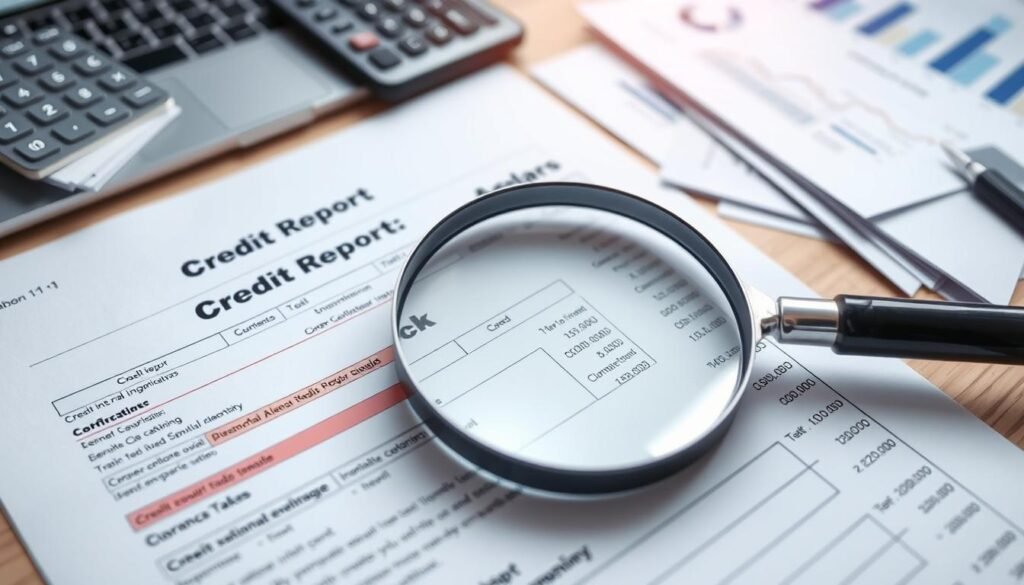Imagine getting denied a mortgage or car loan because of a sudden drop in your credit score. Many people find errors in their credit reports that can harm their financial health for years. It’s not just numbers; it’s your financial life.
Fixing these errors is a journey to financial freedom and peace of mind. It’s about correcting outdated info or duplicate accounts. Knowing how to find these problems can lead to better financial opportunities.
Fortunately, there are resources like the Federal Trade Commission (FTC) and the Consumer Financial Protection Bureau (CFPB) to help. They offer steps to review and dispute credit report errors. Tools from companies like Experian and Credit Sesame also make it easier to keep an eye on your credit. By starting this process, you’re not just fixing errors; you’re taking back control of your financial future.
Key Takeaways
- Errors in your credit report can significantly impact your financial health.
- Conducting a thorough credit report analysis helps identify inaccuracies.
- FTC and CFPB provide useful guidelines for error correction on credit reports.
- Regular credit report review is essential for ongoing credit score improvement.
- Credit monitoring tools from Experian and Credit Sesame facilitate easy oversight.
What is a Credit Report?
A credit report is a detailed record of your credit history. It lists your personal info, like your name, address, and Social Security number. It also shows your credit accounts and how you’ve paid them back.
Three big credit bureaus—Equifax, Experian, and TransUnion—put together these reports. They might have different info since not all creditors report to all three. So, it’s key to check your report from each credit bureau often.
These reports also include public records like bankruptcies and liens. They show who has looked at your credit information and why.
The Fair Credit Reporting Act (FCRA) makes sure credit reports are right and fair. It lets you get your report for free once a year from each big credit bureau. It also helps you fix any mistakes, keeping your credit info accurate.
Why Your Credit Report Matters
Your credit report is very important. It affects how lenders see you. Knowing your report well can help you get loans more easily and find better financial deals.

Also, your credit report can change the interest rates you get on loans. A good report can mean lower rates, saving you money. But, a bad report might lead to higher rates or even no loan at all.
It’s not just banks that look at your report. Employers and landlords do too. A good report can lead to better jobs and housing options.
The Consumer Financial Protection Bureau (CFPB) says a correct credit report is key to your financial health. Credit counseling services agree, saying it’s crucial for managing your money well. The National Foundation for Credit Counseling adds that your credit history affects loan terms, making a clean report very important.
- A positive credit report makes it easier to get loans.
- A clean report can get you better interest rates.
- It opens up more financial opportunities, like better jobs and housing.
Common Errors Found in Credit Reports
Credit report errors can harm your financial health. It’s key to find and fix these mistakes quickly. We’ll look at the most common errors and what they mean.
Personal Information Mistakes
Personal info errors, like identity errors, can happen for many reasons. They might be simple mistakes or signs of identity theft. These errors can hurt your credit score and might be due to wrong names, addresses, or Social Security numbers.
Account Reporting Errors
Account reporting errors are another big problem. These can include wrong account statuses, balances, or payment histories. Such mistakes can lead to bad loan terms for you.
Outdated Information
Old info on your credit report can also cause issues. Sometimes, accounts that should be gone are still listed. Or, negative info might not be erased when it should be. Keeping your report up to date is crucial.

Duplicate Accounts
Duplicate accounts can make your debt look higher. This is when the same account is listed twice. It’s important to watch your report for these errors.
Checking your credit report often and disputing errors helps keep your credit accurate. This is key to a healthier financial life.
How to Obtain Your Credit Report
Getting your credit report is key to managing your finances. You can get a free credit report from Equifax, Experian, and TransUnion every 12 months. This is a right given by law, and it’s crucial to use it to check your credit info.

- Visit AnnualCreditReport.com and fill out the request form.
- Provide the necessary personal information to verify your identity.
- Select the credit reports from the bureaus you wish to obtain.
- Review and save your reports for your records.
You can also get your credit report by phone or mail. Just call or write to the credit agencies using the credit bureau contacts on their websites.
The contact methods are summarized below:
| Method | Details |
|---|---|
| Online | Visit AnnualCreditReport.com and follow the instructions. |
| Phone | Call the toll-free number and follow the prompts. |
| Download and fill out the request form from the website, then send it to the specified mailing address. |
Staying on top of your credit health means checking your reports often. Use AnnualCreditReport.com and talk to credit bureau contacts to protect your financial standing. This way, you can spot and fix problems early.
How to Read and Understand Your Credit Report
At first, reading your credit report might seem hard. But, breaking it down into key parts makes it easier. Your report has sections like personal info, credit accounts, public records, and inquiries. Knowing each part is key for keeping your financial records right and doing credit analysis well.

Personal Information
Your personal info includes your name, address, Social Security number, and job history. It’s vital to check this info for accuracy. This is because it’s used to identify you and is part of your financial records.
Credit Accounts
This section lists your current and past credit accounts. It includes things like credit cards, mortgages, and loans. It shows account status, balances, and payment history. By carefully looking at your credit report, you can find any mistakes that might harm your credit score.
Public Records
Public records include info on bankruptcies, judgments, and tax liens. These can really hurt your credit score and financial trustworthiness. Checking this section often helps keep your financial records current and corrects any wrong info.
Credit Inquiries
This part shows who has looked at your credit info recently. There are hard inquiries, which can lower your score, and soft inquiries, which don’t. Looking at this section often helps you see who’s checking your credit and how often.
The Importance of Monitoring Your Credit
Keeping an eye on your credit is key to a healthy financial life. Regularly checking your credit report helps spot identity theft protection early. This lets you act fast. Credit alert services send updates on any credit report changes, helping with proactive credit management.
According to the Federal Trade Commission (FTC), credit monitoring can significantly reduce the risk of long-term financial damage caused by identity theft.
Credit alert services alert you to suspicious activities, new inquiries, or account changes. This way, you can quickly fix any issues, protecting your credit. Quick action is crucial for identity theft protection.

Proactive credit management means more than just watching. It’s about knowing what affects your credit score. Being informed helps you make smart financial choices and keep your credit strong.
| Benefit | Description |
|---|---|
| Early Detection | Identify suspicious activities rapidly, reducing potential damage. |
| Credit Reputation | Maintain and manage your credit score and report actively. |
| Timely Notifications | Receive updates on credit inquiries and changes. |
Using credit alert services and proactive credit management helps protect your finances well.
Steps to Dispute Errors on Your Credit Report
Disputing errors on your credit report can boost your score and financial health. You need to contact credit bureaus, provide evidence, and follow up until it’s fixed. This guide will help you through each step for a successful outcome.

Contacting Credit Bureaus
Start by reaching out to Experian, Equifax, and TransUnion. Write a detailed letter explaining the errors you’ve found. It’s important to communicate clearly and include your personal info and a clear description of each error.
You can send your dispute by mail or online through their websites.
Providing Supporting Documentation
It’s key to back up your dispute with evidence. Collect documents like bank statements, payment records, and letters from creditors. Attach these documents to your dispute, along with a copy of your credit report.
Make sure all documents are clear and labeled correctly to avoid confusion.
Following Up on Your Dispute
After you’ve started the dispute, it’s important to follow up. Credit bureaus have 30 days to look into and reply to your claim. If you don’t hear back, contact them to check on your dispute.
If you still don’t get a resolution, consider taking your complaint to higher authorities or seeking legal help. Being consistent and persistent can greatly help your dispute’s outcome.
How Credit Repair Services Can Help
Fixing credit scores can be tough due to the complex world of credit reports. Credit repair companies offer professional help. They tackle inaccuracies to improve your financial health.
Credit repair services look for errors in your credit report. These errors might include wrong personal info, incorrect account details, and old data. They help fix these issues, often faster and more effectively than you can.
Here are some key benefits of using professional credit assistance:
- Expertise in Handling Disputes: They know the Fair Credit Reporting Act (FCRA) well. They know how to talk to credit bureaus to fix errors.
- Time-Saving: Fixing your credit yourself takes a lot of time. Professionals can speed up the process with their knowledge and resources.
- Personalized Strategy: Many offer advice and plans based on your specific situation.
But, be careful of scams. The Federal Trade Commission (FTC) warns about credit repair scams. They promise quick fixes for a fee. Always do your research and choose well-reviewed, accredited services.
Success stories show the benefits of professional credit help. Many have seen their credit scores improve. With the right support, you can also achieve a better financial future.
The Role of Credit Counseling in Credit Repair
Credit counseling is key in helping people fix their credit. It offers financial education and support. Certified credit counselors create debt management plans tailored to each client’s needs. These plans help with budgeting and negotiating with creditors to lower interest rates or waive fees.
Working with certified credit counselors has many benefits. They are experts, having gone through tough training and certification. They help understand complex credit reports and find areas for improvement. They also teach financial education programs to help manage money better and make smart financial choices.
Many non-profit credit counseling organizations in the U.S. offer great resources and services. Personal finance experts say people who use these programs see big improvements in their credit scores. This is because of the structured debt tackling and ongoing support from certified professionals.
Success rates for those in credit counseling programs are high. These programs not only cut down debt but also help achieve long-term financial stability. By using debt management plans, clients can pay off debts step by step. They also get ongoing advice on keeping good financial health.
| Advantages of Credit Counseling | How It Helps in Credit Repair |
|---|---|
| Financial Education | Provides knowledge to make informed financial decisions |
| Debt Management Plans | Creates a realistic plan to pay off debts systematically |
| Certified Credit Counselors | Offers professional guidance and ongoing support |
Building and Maintaining Good Credit
Good credit is key for financial stability and reaching your goals. By following responsible credit habits and knowing what affects your score, you can improve your credit health.
Paying Bills on Time
On-time payments are crucial for your credit score. It shows you’re responsible with credit. Set up automatic payments or reminders to avoid late fees and protect your score.
Maintaining Low Credit Card Balances
Keep your credit card balances low compared to your limits. This is your debt-to-credit ratio, a big factor in your score. Experts say use no more than 30% of your credit. Watching your debt ratio helps prevent score drops from high balances.
Limiting New Credit Applications
Each new credit check lowers your score a bit. So, apply for new credit wisely. It shows you’re not overusing credit. Be careful and choose when to apply for new credit.
“Your credit score is a reflection of your responsible credit habits. By paying bills on time, maintaining low credit card balances, and being selective with new credit applications, you can build and maintain excellent credit.” – Financial Planner
Tools to Help Monitor Your Credit
Using credit monitoring software is a great way to watch your credit health. These tools give you updates and reports in real-time. This helps make sure your credit info is correct.
Identity theft alerts are a key feature of many credit monitoring tools. They alert you right away if something fishy happens. This lets you act fast to protect your money. Services from Experian and TransUnion are top picks for their thorough coverage and trustworthiness.
Apps like Mint and Credit Karma now track your credit too. They help with budgeting and tracking expenses. Plus, they give you insights into your credit score and report. These apps make it easier to manage your money and stay informed.
Here’s a quick look at some top tools in the market:
| Tool | Features | User Rating |
|---|---|---|
| Experian | Credit monitoring, identity theft alerts, credit reports | 4.7/5 |
| TransUnion | Credit monitoring, identity theft alerts, fraud resolution | 4.5/5 |
| Mint | Personal finance app, budget tracking, credit score monitoring | 4.6/5 |
| Credit Karma | Personal finance app, free credit scores, credit report monitoring | 4.8/5 |
Being proactive with your credit is smart for your financial health. Tools like advanced software, timely alerts, and apps give you the info and ease you need. They help you stay ahead of fraud and keep your finances in check.
Understanding the Impact of Credit History
Knowing how your credit history affects you is key to keeping your long-term credit health strong. It plays a big role in whether you get loans or not. Keeping your finances in order can lead to better loan terms and more chances to grow.
Reports from the financial world highlight the value of a clean credit history. A good credit report makes you more appealing to lenders. Paying bills on time and keeping your credit use low can improve your financial standing.
Studies show that people with strong credit histories tend to be more financially stable. They also get access to better financial products. Lenders look closely at your financial history to see if you can repay loans.
Here are some perks of having a good credit history:
- Lower Interest Rates: Good credit can get you loans and credit cards with lower interest rates.
- Higher Loan Limits: Banks often give more credit to those with excellent credit.
- Faster Approval: A solid financial history can make loan approvals quicker.
In short, understanding your credit history is crucial for your long-term credit health. By keeping your creditworthiness in check and maintaining a good financial record, you can open doors to better financial opportunities and stability.
Credit Score vs. Credit Report: What’s the Difference?
Your credit score and credit report are key parts of your financial picture. They help lenders decide if they should lend to you. Knowing the difference between them can help you manage your money better and reach your financial goals.
Components of a Credit Score
The credit score calculation looks at several important factors. These factors give a quick view of how good you are with money. The FICO score, which most people use, breaks these down into parts:
| Component | Percentage Influence |
|---|---|
| Payment History | 35% |
| Credit Utilization | 30% |
| Length of Credit History | 15% |
| New Credit Inquiries | 10% |
| Credit Mix | 10% |
Each part of your credit score plays a big role. For example, paying bills on time can really help your FICO score. But, too many new credit checks can hurt it.
How Credit Reports Feed Into Your Credit Score
Your credit report is a detailed look at your credit history. It shows who you’ve borrowed from, how much you owe, and any bad marks. The credit report influence on your score is huge, as it directly affects the score’s parts.
For example, late payments on your report can hurt your payment history score. High credit card balances can also lower your score. By knowing how these parts work together, you can improve your report and score. This can make your financial health better overall.
Conclusion
Understanding credit is key to your financial freedom. This guide has shown you how to get the most out of your credit reports. By fixing errors and disputing wrong information, you improve your credit score.
Keeping an eye on your credit is vital for long-term financial health. Experts say checking your credit often and managing it wisely are crucial. Using credit repair services and counseling can also help strengthen your financial position.
Being proactive in managing your credit is essential. The tips in this guide will help you face financial challenges head-on. By staying informed and careful, you build a strong financial future for yourself and others.



